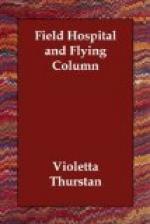“Let us come into the hotel and get a meal while we wait,” suggested the Prince, mindful of our uneaten supper, and we followed him to the restaurant—still mourning those beautiful beds we had left behind us, and so tired we didn’t much care whether the Germans came or not. Nothing can express utter desolation much more nakedly than a Grand Hotel that has been through a week or two’s bombardment. Here indeed were the mighty fallen. A large hole was ripped out of the wall of the big restaurant, close to the alcove where the band used to play while the smart people dined. An elaborate wine-list still graced each little table, but coffee made from rye bread crusts mixed with a little chicory was the only drink that a few white-faced waiters who crept about the room like shadows could apologetically offer us. We sat there till nearly 3 A. M., and Colonel S., utterly worn out, was fast asleep with his head on the little table, and there was no sign of any car, or of any Germans, so we went to lie down till morning.
In the morning things began to look cheerful. The Germans had still not arrived, our own car turned up, and best of all the Prince heard officially that every wounded man who was at all transportable had now been successfully got out of Lodz. It was a gigantic task, this evacuation of over 18,000 wounded in four days, and it is a great feather in the Russian cap to have achieved it so successfully.
It was a most lovely day with a soft blue sky, and all the world bathed in winter sunshine. Shelling had ceased during the night, but began again with terrific force in the morning, and we started off under a perfect hail of shells. There were four German aeroplanes hovering just above us, throwing down bombs at short intervals. The shells aimed at them looked so innocent, like little white puff-balls bursting up in the blue sky. We hoped they would be brought down, but they were too high for that. The bombs were only a little diversion of theirs by the way—they were really trying to locate the Russian battery, as they were evidently making signals to their own headquarters. Danger always adds a spice to every entertainment, and as the wounded were all out and we had nobody but ourselves to think about, we could enjoy our thrilling departure from Lodz under heavy fire to the uttermost. And I must say I have rarely enjoyed anything more. It was simply glorious spinning along in that car, and we got out safely without anyone being hurt.
We passed through Breeziny, where the tail-end of a battle was going on, and the Prince stopped the car for a few minutes so that we could see the men in the trenches. On our way we passed crowds of terrified refugees hurrying along the road with their few possessions on their backs or in their arms; it reminded me of those sad processions of flying peasants in Belgium, but I think these were mostly much poorer, and had not so much to lose. Just as the sun was setting we stopped for a rest at a place the Prince knew of, half inn, half farm-house. We looked back, and the sky was bloody and lurid over the western plain where Lodz lay. To us it seemed like an ill omen for the unhappy town, but it may be that the Germans took those flaming clouds to mean that even the heavens themselves were illuminated to signal their victory.




